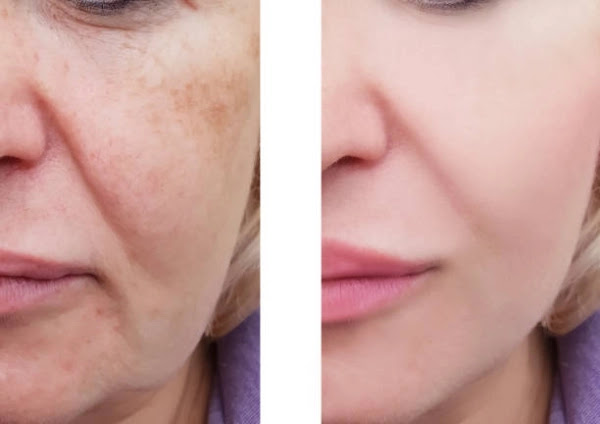Fading Imperfections
Harnessing Vitamin C Serum to Improve the Appearance of Scars
Introduction
Scars, whether from acne, injury, or surgery, can have a
significant impact on one's confidence and self-esteem. While scars are a
natural part of the skin's healing process, their appearance can often be
distressing, especially when they are prominent or discolored. Vitamin C serum
has emerged as a promising solution for improving the appearance of scars,
thanks to its ability to promote collagen production, fade hyperpigmentation,
and enhance overall skin texture. In this exploration, we delve into the mechanisms
of Vitamin C serum in scar treatment, elucidating its clinical efficacy,
practical recommendations, and potential benefits for achieving smoother, more
uniform skin.
- Promotion of Collagen Synthesis:
Collagen is a key structural protein in the skin that provides strength
and elasticity. When the skin is injured, collagen production increases as
part of the healing process, but the quality of the collagen fibers may be
compromised, leading to the formation of visible scars. Vitamin C serum
plays a crucial role in promoting collagen synthesis, aiding in the
remodeling of scar tissue and improving its appearance. Ascorbic acid, the
active form of Vitamin C, serves as a cofactor for the enzyme prolyl
hydroxylase, which is essential for collagen stabilization and maturation.
By enhancing prolyl hydroxylase activity, Vitamin C increases collagen
production and deposition in the dermis, resulting in smoother, more
resilient scar tissue.
- Reduction of Hyperpigmentation:
Hyperpigmentation is a common concern associated with scars, particularly
in individuals with darker skin tones. Post-inflammatory hyperpigmentation
(PIH) occurs when melanocytes produce excess melanin in response to skin
injury or inflammation, resulting in dark spots or patches. Vitamin C serum
helps to fade hyperpigmentation by inhibiting the enzyme tyrosinase, which
is essential for melanin synthesis. Ascorbic acid regulates melanocyte
activity and melanin production, leading to a more even distribution of
pigment in the skin. By reducing hyperpigmentation, Vitamin C serum helps
to minimize the contrast between the scar and surrounding skin, making the
scar less noticeable and improving overall skin tone.
- Antioxidant Protection and Scar
Healing: The skin's healing process is often accompanied by oxidative
stress, which can impair wound healing and lead to scar formation. Vitamin
C serum offers potent antioxidant protection against oxidative damage,
neutralizing free radicals and promoting a more favorable environment for
scar healing. Ascorbic acid scavenges reactive oxygen species (ROS)
generated during the inflammatory phase of wound healing, preventing lipid
peroxidation and protein oxidation. Additionally, Vitamin C stimulates the
expression of genes involved in antioxidant defense mechanisms, further
enhancing the skin's ability to combat oxidative stress. By reducing
oxidative damage, Vitamin C serum supports more efficient scar healing and
promotes better overall outcomes.
- Enhancement of Skin Texture: The
texture of scar tissue can vary depending on factors such as the depth and
severity of the injury, as well as the individual's skin type and healing
response. Vitamin C serum helps to improve skin texture by promoting cell
turnover and collagen remodeling, resulting in smoother, more even scar
tissue. Ascorbic acid stimulates the production of collagen and elastin,
which are essential for maintaining skin elasticity and resilience.
Additionally, Vitamin C regulates the expression of genes involved in
cellular turnover, such as matrix metalloproteinases (MMPs) and tissue
inhibitors of metalloproteinases (TIMPs), further accelerating the
remodeling process. By enhancing skin texture, Vitamin C serum helps to
minimize the appearance of scars and create a more uniform surface.
- Clinical Efficacy and Practical
Recommendations: Clinical studies have demonstrated the efficacy of
Vitamin C serum in improving the appearance of scars and promoting scar
healing. Regular use of Vitamin C serum has been shown to reduce scar
redness, fade hyperpigmentation, and improve overall scar texture. To
maximize the benefits of Vitamin C serum for scar treatment, choose a
high-quality formulation with stable Vitamin C derivatives, such as
ascorbic acid or sodium ascorbyl phosphate, at concentrations of around
10% to 20%. Apply Vitamin C serum to clean, dry skin once or twice daily,
focusing on areas with scars, and follow with moisturizer to lock in hydration. Additionally, incorporate other scar-reducing ingredients, such
as silicone gel or onion extract, into your skincare routine for enhanced
results.
Conclusion
Vitamin C serum offers a multifaceted approach to improving
the appearance of scars, thanks to its ability to promote collagen synthesis,
fade hyperpigmentation, provide antioxidant protection, and enhance skin
texture. By incorporating Vitamin C serum into your skincare routine, you can
effectively address the visible signs of scarring and achieve smoother, more
uniform skin. With consistent use and proper skincare regimen, individuals can
harness the scar-reducing power of Vitamin C serum to boost confidence and
restore skin health.
